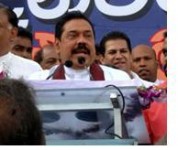No change of heart in Sri Lanka

President Mahinda Rajapaksa does not seem inclined to be particularly magnanimous towards the media following his re-election by a handsome majority. If the watching world was looking for any positive signals in this regard what it got was the opposite. On January 30 an anti-government newspaper was shuttered and its editor arrested on allegations of publishing details of an ongoing investigation against a former Tamil rebel now in custody.
The Lanka newspaper, published by the Marxist Janatha Vimukthi Peramuna (The Peoples Liberation Front), was raided on Friday and its editor Chandana Sirimalwatte was arrested Saturday for questioning by the Criminal Investigations Department (CID). The Sunday Leader reported on Janury 31 that the CID sealed the Lanka newspaper office in Delkanda, Nugegoda after receiving a court order.
The newspaper office according to an editorial member of Lanka was sealed around
A police spokesman said Sirimalwatte was detained after the newspaper published details disclosed by Kumaran Pathmandan, the chief arms procurement agent for the Tamil rebels, who were largely defeated by the Sri Lankan military last year.
Investigative journalism and scoops are apparently not welcome yet in the re-elected president?s second term. Lanka had also published other anti-government articles in the lead-up to
Meanwhile, a reporter and cartoonist of a news website remain missing after six days. The journalist, Prageeth Eknaligoda of Lanka e-news, has been missing since last Sunday, according to his family members.
Eight other journalists who served in state media institutions have been indicted on allegations that they worked for Fonseka, according to Sify news.
The persecution of the Sri Lankan media has been a long running international story, particularly after the killing in January last year of Lasantha Wickrematunge, the founding editor of the Sunday Leader. Several journalists fled to seek asylum in the West, and an expatriate group called Journalists for Democracy has helped to keep Western media attention focused on the vulnerability of journalists in
The elections saw state-owned media both print and television, run news favouring the incumbent, and devote most of the coverage to him. When the state media runs propagandist programmes in that country it seems to be a real issue, because they are more watched that our state media are. And in the subcontinent,
Al Jazeera?s Listening Post reported in its last programme before the Sri Lankan elections that President Rajapakse had greeting the country?s entire population on New Year?s Day through an sms. The state?s communication commission had apparently ordered telecom companies to send out that message free. The programme also reported what it suggested was extended misuse of the state media during the poll campaign. It did not quote anybody in government on what they thought of the media?s reporting in
The New York-based Committee to Protect Journalists said it is alarmed by reports that journalists in
"We are receiving reports of government retribution against journalists who sided with the opposition in the election. "Given the ugly history of attacks on journalists in Sri Lanka, we call on President Mahinda Rajapaksa to ensure the safety of all journalists in Sri Lanka, and to use his new mandate to reverse the repressive trends of the past several years," said Bob Dietz, CPJ's Asia program coordinator.
(This article also draws upon the Media Matters column in the Hindu, January 31,2009)






